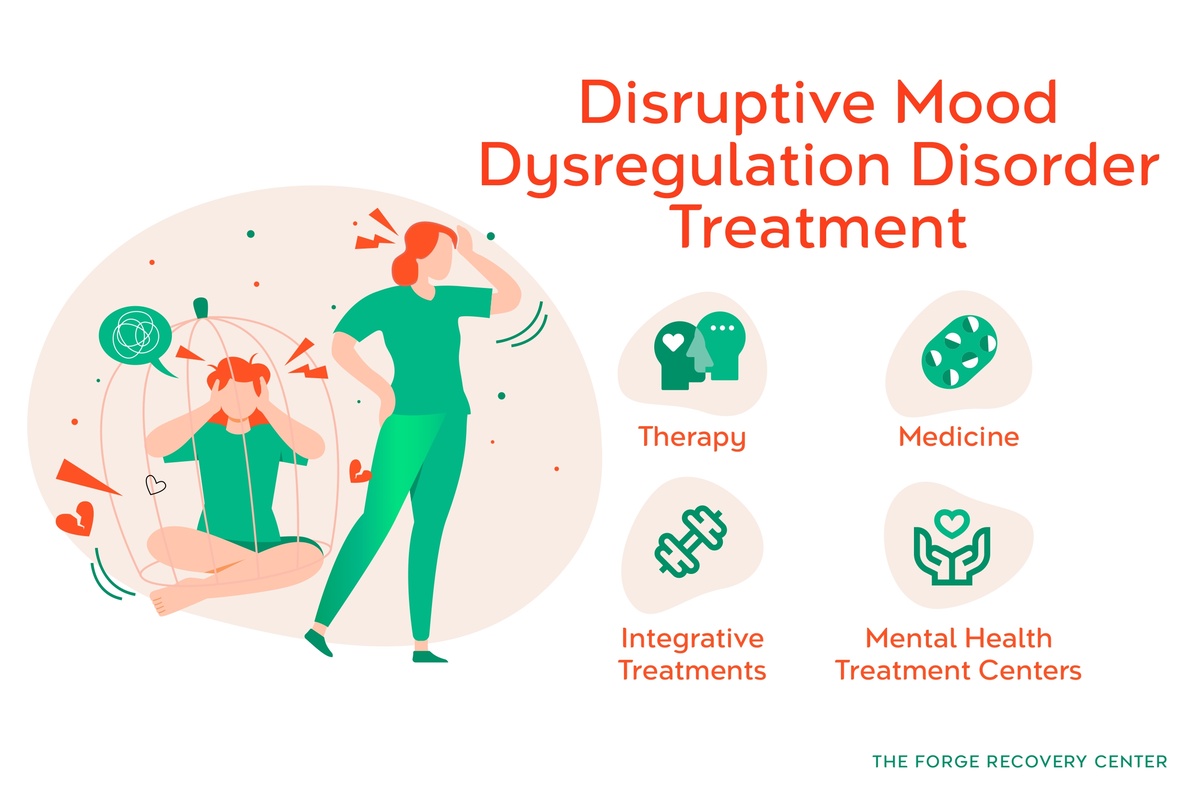Disruptive Mood Dysregulation Disorder: Causes, Symptoms, & Treatment


Disruptive mood dysregulation disorder (DMDD) is a condition that affects children and adolescents, leading to chronic irritability and frequent, intense temper outbursts. We recognize the challenges it poses at home and school and are here to remind you that help is available, with treatment options typically including therapy and medication if necessary. Learn more below, and call The Forge Recovery Center today to provide your child with the care they need and deserve.
What Is Disruptive Mood Dysregulation Disorder?
Disruptive mood dysregulation disorder (DMDD) is a mental health condition characterized by severe and recurrent temper outbursts that are out of proportion to the situation. These outbursts can be verbal or behavioral and occur frequently, leading to significant impairment in social, academic, and family functioning.
Children with DMDD may also experience persistent irritability or anger between outbursts. It is important to differentiate DMDD from other mood disorders such as bipolar disorder or oppositional defiant disorder, as the treatment approach may vary.
Diagnosis of DMDD typically occurs in childhood and requires a comprehensive evaluation by a mental health professional. Treatment may involve therapy, medication, and support for both the child and their family.
Disruptive Mood Dysregulation Disorder Symptoms
When dealing with mood dysregulation, individuals often exhibit intense temper outbursts. These outbursts can have a significant impact on your daily life, affecting relationships and social interactions. Managing these behaviors is crucial for improving your overall well-being.
Symptom Evolution
Childhood
During childhood, severe irritability is a common symptom of disruptive mood dysregulation disorder. You may experience frequent temper tantrums and struggle to regulate your emotions effectively. Seeking early intervention and support can help in managing these challenges.
Adolescence
As you transition into adolescence, the symptoms of disruptive mood dysregulation disorder may evolve. While bad moods and temper outbursts persist, they can manifest differently due to hormonal changes and increased stressors during this developmental stage. It's essential to continue seeking professional guidance to navigate these changes effectively.

Are You Struggling with Mental Health or Addiction?
We Can Help. Call Us Now!
CALL: 877-839-1772
Treatment for Disruptive Mood Dysregulation Disorder
Disruptive mood dysregulation disorder is typically treated with a combination of therapy and medication. Other integrative treatments, such as certain lifestyle changes and the use of nutritional supplements, may also help to treat DMDD. Here’s an overview of DMDD treatment options:

Therapy
Therapy is a crucial component in managing disruptive mood dysregulation disorder. Cognitive-behavioral therapy (CBT) focuses on identifying and altering negative thought patterns, helping you develop coping strategies. Dialectical behavior therapy (DBT) teaches skills to regulate emotions, improve relationships, and cope with stress effectively. It emphasizes validation and acceptance. Family therapy involves the whole family in therapy sessions to improve communication, reduce conflicts, and strengthen relationships. It helps create a supportive environment for the individual.
Medication
In some cases, medication may be prescribed to manage symptoms of disruptive mood dysregulation disorder. Mood stabilizers help control mood swings and irritability by balancing brain chemicals. Antidepressants can be used if symptoms include severe depression or anxiety. They work by regulating neurotransmitters in the brain to improve mood. Antipsychotic medications may also be prescribed if symptoms are severe or if there are psychotic features present. They help manage aggressive behavior and mood disturbances.
Integrative Treatments
Apart from traditional therapies and medications, integrative treatments can also be beneficial in managing disruptive mood dysregulation disorder.
Lifestyle Adjustments: Incorporating regular exercise, maintaining a healthy diet, ensuring adequate sleep, and reducing stress can positively impact mood regulation.
Nutritional Supplements: Certain supplements like omega-3 fatty acids and magnesium have shown potential in improving mood stability when used alongside other treatments.
Mental Health Treatment Centers
At mental health treatment centers, you can expect a multidisciplinary approach involving therapists, psychiatrists, and other healthcare professionals working together to create a personalized treatment plan for your child. This may include a combination of therapy sessions, medication management, and lifestyle interventions to support their journey toward better mental health.
What Causes Disruptive Mood Dysregulation Disorder?
Genetics are thought to majorly drive disruptive mood dysregulation disorder, although environmental factors and early life stressors can also come into play. Here’s a summary of the typical causes of DMDD:
Genetic Predisposition
Genetic predisposition plays a significant role in disruptive mood dysregulation disorder (DMDD). Your genetic makeup can influence the likelihood of developing this disorder. Certain genes may increase susceptibility to DMDD, impacting how your brain regulates emotions.
Environmental Factors
In addition to genetics, environmental factors can also contribute to the development of DMDD. Your environment, including your upbringing and surroundings, can shape how your emotional regulation develops. Exposure to high levels of stress or trauma can exacerbate symptoms of DMDD.
Family dynamics
Socioeconomic status
Peer relationships
Early Life Stressors
Early life experiences and stressors can have a lasting impact on your emotional well-being. Traumatic events during childhood, such as abuse or neglect, can increase the risk of developing DMDD later in life. Your ability to cope with stress and regulate emotions may be influenced by these early experiences.
Childhood trauma
Parental conflict
Neglect or abuse
Are You Struggling with Mental Health or Addiction?
We Can Help. Call Us Now!
CALL: 877-839-1772
How DMDD Is Diagnosed
DMDD is diagnosed according to the criteria set in the DSM-5, alongside a set of assessments and evaluations conducted by mental health professionals. Here’s a more in-depth look at the diagnosis process:
Diagnostic Criteria
To diagnose disruptive mood dysregulation disorder (DMDD), healthcare professionals follow specific criteria outlined in the DSM-5. Symptoms must manifest before age 10 and persist for over a year. Your child must display severe temper outbursts at least three times a week. They should exhibit irritable or angry moods between outbursts.
Assessment Process
During the assessment process for DMDD, mental health professionals conduct thorough evaluations. They gather information from parents, and teachers, and observe your child's behavior. Psychological tests may be administered to assess emotional regulation and rule out other conditions like bipolar disorder. You may also be required to maintain a mood diary to track your child's emotional states.
Challenges in Diagnosis
Diagnosing DMDD can be challenging due to overlapping symptoms with other disorders like oppositional defiant disorder and bipolar disorder. The fluctuating nature of mood symptoms complicates accurate diagnosis. Misinterpretation of typical childhood behaviors as signs of DMDD can lead to overdiagnosis. You may encounter difficulties in finding healthcare providers with expertise in diagnosing and treating DMDD accurately.

Managing Symptoms of DMDD
Managing your child’s DMDD symptoms is a matter of instilling them with healthy coping strategies, and being there to support them. Let’s explore these symptom management measures further:
Coping Strategies
When dealing with disruptive mood dysregulation disorder (DMDD), implementing effective coping strategies is crucial. Managing stress through relaxation techniques like deep breathing can help regulate emotions. Creating a daily routine can provide structure and stability, reducing emotional outbursts.
To manage irritability, consider practicing mindfulness and staying aware of triggers that escalate your emotions. Engaging in physical activities such as exercise or sports can release pent-up energy and improve mood. Expressing emotions through journaling or talking to a trusted individual can also be beneficial.
Support Systems
Having a strong support system is essential in coping with DMDD. Seeking professional help from therapists or counselors can provide valuable guidance and tools to manage symptoms effectively. Family support plays a significant role; involving family members in therapy sessions can enhance understanding and create a supportive environment.
Connecting with peers who understand your struggles can offer empathy and encouragement. Joining support groups for individuals with similar challenges can provide a sense of belonging and reduce feelings of isolation. Remember, you are not alone in this journey.
Are You Struggling with Mental Health or Addiction?
We Can Help. Call Us Now!
CALL: 877-839-1772
Prevalence of Disruptive Mood Dysregulation Disorder
Disruptive mood dysregulation disorder is fairly common, with 0.8% to 3.3% of children in the U.S. exhibiting symptoms. This disorder often co-occurs with other mental health conditions such as attention-deficit/hyperactivity disorder (ADHD) or oppositional defiant disorder (ODD).
In the U.S., disparities exist in the diagnosis and treatment of DMDD among various demographic groups. Factors such as socioeconomic status, access to mental health services, and cultural beliefs can influence how DMDD is identified and managed. Regional differences in healthcare infrastructure may impact the availability of specialized care for individuals with disruptive mood dysregulation disorder.
Closing Thoughts
You now have a better understanding of disruptive mood dysregulation disorder (DMDD), its symptoms, causes, diagnosis, treatment options, and prevalence. Managing the symptoms of DMDD can be challenging but with the right support and interventions, it is possible to improve the quality of life for individuals with this condition.
Remember, early detection and seeking professional help are crucial in effectively managing DMDD. Educating yourself and others about DMDD can reduce stigma and increase awareness, leading to better support systems for those affected. Stay informed, stay proactive, and remember that you are not alone in this journey towards managing disruptive mood dysregulation disorder.
Are You Struggling with Mental Health or Addiction?
We Can Help. Call Us Now!
CALL: 877-839-1772
Disruptive Mood Dysregulation Disorder Treatment in Orange County
DMDD can significantly impact the lives of children and adolescents, causing persistent irritability and disruptive outbursts. We empathize with the difficulties faced by families and educators and are here to remind you that support is within reach. Treatment options, including therapy, medication, and lifestyle changes, can make a significant difference. At The Forge Recovery Center, we have everything your child needs to overcome DMDD, from mental health professionals to treatment modalities to guide their journey. Call us today if your child is in need of professional treatment and support.
Treatment Modalities We Offer
At The Forge Recovery Center, we offer a range of evidence-based treatment modalities to support your healing journey, including:
Case Management
Our experts guide clients toward resources that support recovery, assessing personal risks to create a comprehensive treatment plan.
CBT
Cognitive-behavioral therapy (CBT) assists clients with modifying negative thought patterns and behaviors, paving the way for psychological healing.
DBT
Dialectical behavioral therapy (DBT) assists individuals dealing with emotional instability due to mental disorders and substance abuse, promoting emotional regulation and positive life changes.
EMDR
Eye movement desensitization and reprocessing (EMDR) allows clients to process trauma that may impact their addiction or mental disorder, using eye movement techniques to reduce psychological distress.
Experiential
Experiential therapy helps you rekindle life’s joys and confront the underlying trauma of addictive behaviors through engaging therapeutic activities.
Family Counseling
Family therapy strengthens bonds and nurtures a supportive network crucial for sustained recovery and abstinence.
Group Therapy
Group sessions provide a communal space for support, improving recovery through shared experiences and collective resilience.
Individual Therapy
Personalized, one-on-one therapy sessions address the unique challenges faced by each client, supporting their journey toward a substance-free life.
MAT
MAT combines approved medications with counseling to effectively combat addiction, easing withdrawal symptoms and reducing relapse risk.
TMS
Transcranial magnetic stimulation (TMS), a non-invasive technique, uses magnetic fields to stimulate the brain, helping reduce intense drug cravings.
Motivational Interviewing
Motivational interviewing encourages clients to make healthier choices, such as overcoming addiction or reshaping negative thoughts, by fostering self-efficacy.
Trauma-Informed Care
In recognizing trauma’s impact on addiction, trauma-informed care guides clients through treatment, addressing its effects on mental and emotional well-being.



